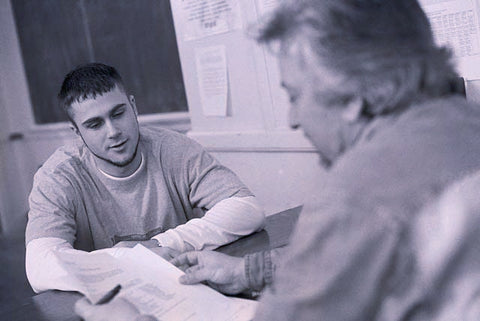CFN9885 - SECTION 4: THE HUMAN RELATIONS COUNSELING MODEL

Okum (2002) has developed what he calls the human relations counseling model which is based upon a client-centered, problem-solving helping relationship. The model says that behavior changes can result from one or both of the following: 1) the client’s exploration and understanding of his/her feelings, thoughts, and actions, or 2) the client’s understanding of - and decision to - modify pertinent environmental and systemic variables.
The theoretical assumptions of the human relations counseling model are as follows:
- People are responsible for, and capable of making, their own decisions within the framework of environmental factors.
- People are controlled to a certain extent by their environment, but they are often able to direct their lives more than they realize. They always have some freedom to choose, even if their options are restricted by environmental variables or inherent biological or personality predispositions.
- Behaviors are purposive and goal-directed. People are continually striving toward meeting their own needs, from basic physiological needs to abstract self-actualizing (psychological, sociological, and aesthetic) needs.
- People want to feel good about themselves and continually need positive confirmation of their own self-worth from significant others. They want to feel and behave congruently, to reduce dissonance between internal and external realities.
- People are capable of learning new behaviors and eliminating or lessening existing behaviors, and they are subject to environmental and internal consequences of their behaviors, which in turn serve as reinforcements.
- They strive for reinforcements that are meaningful and congruent with their personal values and belief systems.
- People’s personal problems may arise from unfinished business (unresolved conflicts) stemming from the past (concerning events and relationships) and, although some exploration of causation may be beneficial to clarify the connection between the past and present, most problems can be worked through by focusing on the here and now—on what choices the person has now. Problems may also be caused by incongruence between external and internal perceptions in the present—that is, discrepancies between a person’s actual experience and his or her picture of that experience.
- Many problems experienced by people today are societal or systemic rather than interpersonal or intrapersonal. Deprivation, limited access to resources, and chronic oppression due to gender, race, ethnicity, class, or sexual orientation can create psychological problems. People are capable of learning to affect choices and changes from within the system as well as from without.
When counseling has been successful, clients often have the following experiences:
- Clients begin to perceive their problems and issues from a different perspective or context;
- Clients develop greater understanding and insight into their problems and they develop more appropriate and useful understanding of problems and issues;
- Clients feel better about themselves and their life situation;
- Clients develop more effective and useful ways of responding to, and dealing with, their problems;
- Clients learn to enhance their current relationships and develop new relationships.
